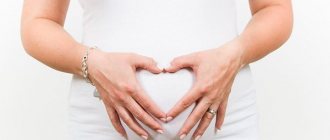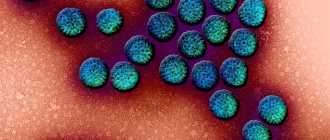The new SARS-Cov-2 virus is highly contagious, especially its mutated strains. It enters the body through mucous membranes. You can become infected with it not only through airborne droplets, but also from dirty hands if you touch surfaces where the virus has settled. Therefore, in some patients, the virus may penetrate the mucous membranes of the digestive tract. This leads to intestinal symptoms of infection.
However, manifestations from the gastrointestinal tract are not the main ones in the clinical picture of coronavirus infection, and they do not appear in everyone. Therefore, if diarrhea appears, you should not make a similar diagnosis for yourself and practice self-medication; you need to see a doctor.
What is diarrhea
Diarrhea is loose stool that comes out of the intestines at least twice a day. Impaired functioning of the intestines, as a result of which the walls do not absorb liquid, causes stool liquefaction. Diarrhea also occurs due to the release of inflammatory secretions or when intestinal motility is disrupted.
Diarrhea is a fairly common phenomenon and rarely does anyone pay attention to stool disorder. And completely in vain. Prolonged diarrhea in an adult is dangerous due to dehydration and removal of useful substances from the body.
Important! If diarrhea lasts several days or longer, you should consult a doctor to avoid complications.
Can you have diarrhea with coronavirus?
Information on the incidence of diarrhea with coronavirus is very contradictory. According to Chinese researchers (at the beginning of 2020), the frequency of diarrhea is from 3.8 to 6% at the onset of the disease, if the infection has a mild to moderate course, and with the duration of COVID-19 manifestations, 34% of patients had diarrhea.
In other studies conducted later, as more information became available, diarrhea was reported in 14% of people with the virus. Most had diarrhea no more than 3 times per day, did not lead to significant dehydration, and there was no association between diarrhea and worsening COVID-19.
The most recent studies note that manifestations of intestinal symptoms were observed to one degree or another in almost 81.4% of patients, which some associate with the emergence of new strains and more careful recording of patient complaints. Data were also released that people with intestinal damage were twice as likely to have more severe infections.
In addition, the study was also examining the detection of the virus in stool samples. According to Chinese scientists, 23% of patients with diarrhea had the virus in their stool. But for now, these data require additional confirmation.
Causes of diarrhea due to coronavirus
Doctors associate the development of diarrhea with COVID-19 with damage to intestinal ACE2 receptors, similar to those in lung tissue. In addition, chronic digestive pathologies are risk factors for the appearance of intestinal manifestations of infection. Thus, people with gastritis, Crohn's disease or ulcerative colitis more often suffer from diarrhea.
The number of receptors in the intestines varies from person to person, so the risk of developing an intestinal form of infection varies. There is no data yet on what level of viral load provokes nausea and diarrhea, and how quickly the immune system can suppress the virus in the intestines.
Why does diarrhea occur in women?
The main cause of diarrhea in women is an intestinal infection. It is enough not to wash your hands before eating or to eat dirty fruit for pathogens to get inside. Some products are contaminated with E. coli even at the manufacturing stage if sanitary standards are not observed, which is especially dangerous since the presence of infection cannot be detected by the average person. Heat treatment can destroy bacteria, but it is useless if a lot of toxins have already accumulated in the product.
What other causes of diarrhea in women can be:
- Harmful production. Toxins that enter the body when working with harmful substances (chemicals, reagents, etc.) cause intestinal upset.
- Stress. When there is a strong emotional stress, the body begins to “fail,” and this is reflected in the intestines. Food passing through the gastrointestinal tract does not have time to be completely digested.
- Hyperthyroidism. Pathology of the thyroid gland, in which the production of hormones increases. The imbalance in turn affects the condition of the intestines.
- Colitis. Inflammation in the intestines with the formation of ulcers.
- Taking antibiotics. The drugs destroy not only pathogenic microflora, but also beneficial bacteria in the intestines that help digest food.
- Crohn's disease. Accompanied by black diarrhea, which indicates internal bleeding in the intestines.
- Intoxication of the body.
- Chronic pancreatitis.
- Parasites in the intestines.
- Impaired functioning of the pancreas.
Diarrhea can also occur in a completely healthy woman; most often this happens during pregnancy, when the body is weakened. During this period, you need to especially carefully monitor your own nutrition and health.
Why can diarrhea occur every day?
Every day, loose stools in an adult can occur for a variety of reasons. Among them the following groups can be distinguished.
Poor nutrition
The foods we eat and our usual diet largely determine the nature and frequency of stool. The following factors contribute to increased frequency of bowel movements and loose stools every day:
- fruits and vegetables with a pronounced laxative effect - beets, plums and prunes, apricots, peaches, figs, fresh dairy products, pickled vegetables;
- products high in coarse plant fiber - legumes (beans, peas, beans), white cabbage, rye bread, bran. They enhance intestinal motility, promoting rapid emptying, resulting in diarrhea developing every day;
- very fatty dishes and products - butter in large quantities, fried, smoked. If there is an excess of them in the diet, the pancreas is overloaded, and it cannot cope with the digestion of incoming food.
With improper nutrition, the stool is unformed, with lumps of undigested food, often accompanied by flatulence.
Poisoning
Diarrhea in the morning every day can occur due to poisoning from poisons, salts of heavy metals (in production or when ingested with poor-quality food), household toxins (ingestion of detergents), and certain medications. A feature of diarrhea in this case is the presence of weakness, abdominal pain; in severe poisoning, convulsions and loss of consciousness may occur.
Infectious diseases
Intestinal infection is one of the most common causes of loose stools every day in an adult. Its development can be caused by viruses, bacteria, protozoa and fungi - accurate identification of the causative agent of the infection is possible only through diagnostic tests (blood and stool tests).
Symptoms of an intestinal infection, in addition to diarrhea, are:
- temperature increase;
- frequent vomiting;
- the presence of pathological impurities in the stool (mucus, blood, greens);
- cramping abdominal pain;
- weakness, lethargy, loss of appetite, muscle pain and headaches.
Chronic diseases
Loose stools can develop every day due to chronic diseases, most often with damage to the gastrointestinal tract due to:
- acute and chronic pancreatitis;
- irritable bowel syndrome;
- cholecystitis;
- peptic ulcer of the stomach and duodenum;
- Crohn's disease;
- digestion and absorption disorders (gluten enteropathy, lactase deficiency, etc.);
- chronic colitis and enterocolitis.
Diarrhea every day in adults and adolescents can also occur for other reasons:
- when the climate and usual diet change - “travelers’ diarrhea”;
- during pregnancy;
- in some women during menstruation and 1–2 days before it begins.
Up to contents
Diarrhea in pregnant women
Diarrhea during pregnancy is not nearly as harmless as it seems. A pregnant woman, due to hormonal changes, is more vulnerable to various types of infections. Diarrhea can develop even after eating a habitual meal that previously did not cause discomfort in the stomach and intestines. What else leads to diarrhea in pregnant women:
- exercise and any physical activity;
- abundance of fiber;
- taking vitamin preparations;
- nervous tension;
- toxicosis.
The longer the period, the more often diarrhea occurs. In the last month, loose stool is a natural reaction of the body - the body prepares for childbirth and starts the process of self-cleansing. Diarrhea can also occur after childbirth. It takes time for the body to return to normal and restore the functioning of all systems.
Main symptoms
The most obvious symptom of diarrhea is loose stools, but this is only one of many signs of an intestinal or stomach disorder. Depending on the accompanying symptoms, the doctor can more accurately determine the disease and select the appropriate treatment. Symptoms of diarrhea:
- lower abdominal pain;
- frequent urination;
- vomit;
- increased gas formation;
- feeling of heaviness;
- high body temperature.
In case of poisoning, diarrhea is most often accompanied by severe vomiting, but these symptoms disappear relatively quickly after taking appropriate medications. If the cause of diarrhea is an infection, then the symptoms only intensify over time. A sign of infectious diseases is a change in the color of stool to gray, and the consistency becomes clayey rather than liquid.
Important! If diarrhea is accompanied by high fever and pain, you should urgently call an ambulance. These symptoms are a sign of appendicitis.
When you have diarrhea, you should pay attention to the color of the mass and the presence of impurities. If a yellow or whitish tint appears, pancreatitis is most likely the cause of diarrhea. Disturbances in the functioning of the pancreas lead to a deficiency of enzymes that help digest food.
It happens less often that a woman experiences either constipation or diarrhea. This is a sign of the presence of parasites in the intestines. Infection is accompanied by weakness, lethargy, and headaches. In addition to diarrhea, there may be nausea and, less commonly, vomiting. When infected with salmonella, the body temperature rises, mucus appears in the stool, and less often blood. If diarrhea lasts for a long time, dehydration occurs. Its main symptoms:
- weakness;
- dizziness;
- dry mouth;
- low pressure;
- rapid pulse;
- blackness before the eyes;
- thirst.
In the most severe stage of dehydration, cachexia occurs, extreme exhaustion of the body with weight loss and loss of ability to work.
On what day does diarrhea occur with coronavirus?
Typically, intestinal manifestations occur 3-4 days after contracting the infection; some patients do not experience other symptoms, and Covid occurs under the guise of food poisoning or indigestion.
Diagnosis of diarrhea due to coronavirus
A diagnosis cannot be made based solely on complaints and the presence of intestinal disorders accompanied by other signs of illness.
The diagnosis can be confirmed using laboratory tests. Rapid tests to determine antibodies using ELISA or PCR tests (nasopharyngeal swab) can be performed. Blood is taken to determine antibodies, but doctors believe that stool tests may also be required.
Diagnostic methods
Before treating diarrhea, it is necessary to identify its underlying cause. Treatment of diarrhea is aimed not only at stabilizing the gastrointestinal tract, but also at the underlying disease. What is the diagnosis of diarrhea:
- Examination by a doctor and consultation. The specialist carefully listens to the patient’s complaints, collects anamnesis to identify what diseases there were in the past. The illnesses of close relatives are also taken into account.
- Examination of stool for the presence of blood.
- Biochemical and general blood test.
- Stool culture.
- Coprogram. Allows you to detect the presence of impurities in the stool (fat, food debris, etc.).
- Analysis of stool for the presence of parasites.
- Breath tests to determine glucose concentration. High rates indicate the presence of a large number of bacteria in the intestines.
In addition to inspection and analysis, hardware tests are used:
- colonoscopy;
- CT;
- endoscopy;
- x-ray of the large intestine;
- Ultrasound;
- taking material from the stomach to identify the bacterium Helicobacter pylori.
Based on the diagnostic results, the doctor will prescribe the medications necessary for treatment.
How to treat
To successfully treat diarrhea, several types of medications are combined. Depending on the cause of diarrhea, different groups of drugs are prescribed:
- antibiotics;
- probiotics;
- analgesics;
- sorbents;
- antiviral drugs;
- choleretic agents;
- enzymes.
In severe cases of dehydration, the administration of saline solution will be required. During the treatment of milder forms of diarrhea, you need to drink more water to avoid dehydration.
What you can do yourself
In addition to treatment with medications for diarrhea, it is important to monitor your diet. First of all, you need to drink as much as possible - after every trip to the toilet. You can drink not only water, but also strong tea without sugar, a decoction of chamomile or rose hips, and dried fruit compotes. You need to drink at least 150 ml of liquid at a time; if diarrhea is accompanied by vomiting, this should be done in small sips. During an acute attack of diarrhea, you may not eat at all, but on the first day the following are allowed:
- rice (with water and without spices);
- crackers.
For fruits, you can eat bananas and baked apples, drink jelly. For the next few days, it is recommended to adhere to certain dietary rules:
- Completely exclude fatty foods, meat broths, fried foods, smoked foods, spices, dishes with spices, etc.
- It is undesirable to eat cabbage, beets, sour berries and fruits.
- You cannot drink sweet tea, milk, store-bought or homemade juices, carbonated drinks, or alcohol.
- You can eat dried bread, porridge with water, pasta, boiled lean meat, soft-boiled eggs.
- You can add salt to dishes when you have diarrhea, but you should not avoid it.
- You need to eat more foods high in potassium. These are jacket potatoes and bananas. If necessary, you can take potassium supplements, since diarrhea removes this trace element from the body.
In addition to following a diet for diarrhea, it is important to especially monitor hygiene:
- wash your hands thoroughly before eating and every time after using the restroom;
- Wash all foods before cooking.
During the treatment of diarrhea, rest, physical and psychological, is important. After a few days, moderate loads are acceptable. If symptoms of diarrhea do not go away after 1-2 days, and your health condition worsens, you should consult a doctor.
Popular questions and answers
We discussed with gastroenterologist Valeria Trapeznikova some issues regarding diarrhea during coronavirus infection and the fight against unpleasant symptoms.
Is it possible to use folk remedies to treat diarrhea due to coronavirus?
First you need to understand the causes of diarrhea, and this, as a rule, can only be done by a doctor. Therefore, treatment should be prescribed by a doctor; folk remedies are not always an effective method, since they usually eliminate the symptoms, and not the cause of diarrhea.
If you have no appetite, should you eat if you have intestinal manifestations of coronavirus?
You must eat, at least in small portions. The body must receive nutrients from the outside for the vital processes it needs, and this also applies to our immunity - it needs food to produce certain proteins and complexes that are necessary to fight the virus.
Why does diarrhea occur after coronavirus?
As is known, the receptors that are affected by the coronavirus are also present in the gastrointestinal tract, so one of the causes of diarrhea is the direct effect of the virus itself on the intestinal mucosa. Also, medications used in the treatment of Covid can cause diarrhea. Well, we must not forget that many patients have chronic diseases of the gastrointestinal tract, which can worsen against the background of coronavirus disease or after recovery.
Can you have diarrhea after getting a coronavirus vaccine?
Yes, after vaccination there may be manifestations of functional disorders in the gastrointestinal tract. As a rule, these symptoms do not last long and go away on their own. But, if suddenly there is no improvement and your health worsens, then you need to consult a doctor.
Sources:
- Pavlov A.I., Khovanov A.V., Bakirova V.E. and others. On the issue of treatment of intoxication and diarrhea syndrome during coronavirus infection // Effective pharmacotherapy. 2022. T. 16. No. 24. pp. 92–98. DOI 10.33978/2307-3586-2020-16-24-92-98
- Zakharova I.N., Sugyan N.G., Moskvich I.K. Russian and international recommendations for the management of children with constipation // VSP. 2014. No. 1. https://cyberleninka.ru/article/n/rossiyskie-i-mezhdunarodnye-rekomendatsii-po-vedeniyu-detey-s-zaporami
- Xiao F. et al. Gastroenterology. 2020;158(6):1831–33.
- Lu R. et al. Lancet. 2020;395(10224):565–74.
- Zhang C. et al. Lancet Gastroenterol Hepatol. 2020;5(5):428–30.
- Diarrhea due to coronavirus - complete information. Coronavirus control. February 2022 https://coronavirus-control.ru/diareya-pri-koronaviruse/










